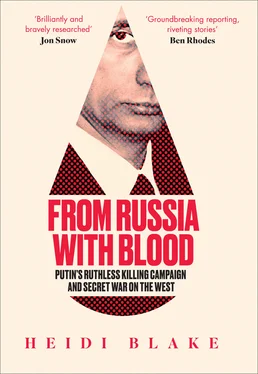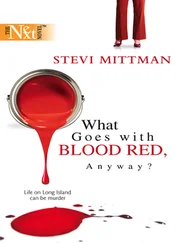When the two men met, Litvinenko got straight to the point. He had received orders to kill the oligarch. The new specialist organized crime unit to which Litvinenko had been transferred, the URPO, was so secretive that it was based in an unmarked bunker outside the FSB’s Lubyanka Square headquarters, and orders were given only verbally. Litvinenko had hoped his transfer augured new and exciting cases investigating matters of the utmost sensitivity, but he had quickly come to realize with dismay what the new unit was really all about. The URPO was the FSB’s secret hit squad.
As Yeltsin’s grip on power weakened and the mob tightened its grip, the president had poured more money into the retooled FSB. The new agency was meant to represent a departure from the barbarous old ways of the KGB, but in reality it was staffed by the same men, and there was nothing about the new Russia that they liked. The URPO had been tasked with taking out organized crime kingpins whose activities were considered a threat to the state, but it wasn’t long before its top brass strayed beyond their brief and began using the unit for specialist assignments of a more political nature. That was how Litvinenko and four of his fellow officers had been called into a meeting one morning and ordered to kill Russia’s most influential oligarch.
The bosses at URPO never felt the need to explain their instructions, and Litvinenko had no idea what Berezovsky had done to wind up on the hit list, but there was one thing he did know for certain. Killing a senior Kremlin adviser was an act of madness—not to mention treason. To make matters worse, that order was followed by an equally unthinkable instruction. A well-liked fellow FSB officer named Mikhail Trepashkin had uncovered a network of corrupt officers within the agency, and now the URPO bosses wanted him dead, too. Trepashkin, who had cut his teeth investigating Moscow’s underground trade in stolen art and antiques before being redeployed to probe Chechen mafia groups in Moscow, was a rare comrade after Litvinenko’s own heart: dogged, idealistic, and single-minded in his pursuit of the bad guys. Litvinenko and his team could no more contemplate murdering one of their own than they could countenance committing treason by going after a member of the government. They resolved to blow the whistle on both plots.
At first, Berezovsky refused to believe what he was hearing. He, too, felt sure that his place inside the Kremlin would protect him from the state’s own assassins. But when Litvinenko brought the other officers from his unit to a meeting and they all confirmed the story, Berezovsky was forced to believe the unbelievable. It was time to warn Trepashkin that he, too, was a target. Over the months that followed, the unwilling assassins met secretly with their two targets as they gamed out how to blow the lid off the plot.
Their plan got under way on a cool April night at Berezovsky’s sprawling dacha, in the countryside outside Moscow. Under cover of darkness, Litvinenko and his colleagues gathered to make a comprehensive video record of the orders they had been given. With that evidence safely in the bag, to be released in the event that any of them was arrested or killed after exposing the plot, the whistle-blowers filed a complaint with Russia’s military prosecution service. A top-secret investigation got under way, and while they waited for the results, Berezovsky ran his own interference inside the Kremlin.
The FSB had clearly spun out of control, and it was time for a changing of the guard. In June of 1998, acting on the advice of Berezovsky and other aides, Yeltsin fired the agency’s director and replaced him with a man who could be trusted to do as he was asked. Vladimir Putin’s boyhood dream had come true: he had made it to the top of the Lubyanka HQ.
Berezovsky was thrilled that Putin was in charge. With his protégé at the helm, he would not only be able to foil the assassination plot but also sweep out his enemies from the FSB. He told Litvinenko to visit the new director and tell him everything. Litvinenko was uncomfortable about that instruction: he was still sitting on the evidence he had started to gather a few years earlier charting Putin’s connections with the Tambov gang in St. Petersburg. But the oligarch was having none of it—he had seen the evidence of Putin’s probity for himself, and they could not afford to pass up such a crucial ally—so Litvinenko reluctantly did what he was told.
The director’s office inside the Lubyanka building was as gray and functional as its occupant. Putin put on his best appearance of cordiality as he came out from behind his desk to greet the visitor, but Litvinenko sized up the small man in an instant. He’s doing everything he can to seem open and likable, he thought to himself, but it’s all for show. Still, hewing to Berezovsky’s instructions, Litvinenko sat down and spilled the beans about the goings-on inside the URPO. Putin listened attentively and thanked him for sharing his information. But Litvinenko could not shake the impression that the man behind the desk was eyeing him with cold hatred.
Soon after that meeting, Putin shut down the URPO and redeployed all its officers unceremoniously. Berezovsky claimed it as a vindication, but the truth was the new director hadn’t had much choice, since the order to disband the unit had come directly from the Kremlin. When autumn came and news reached the whistle-blowers that the military prosecution service had thrown out their complaint, Berezovsky did not flinch. Certain they had the backing of the man at the top of the FSB, he declared it was time to go public.
The oligarch used the pages of his newspaper, Kommersant, to publish an open letter to Putin calling on him to root out corruption in the FSB. Then journalists from every paper and TV station in Moscow were called to a press conference to witness the big crescendo. Out walked four men in ski masks and sunglasses alongside a bare-faced Litvinenko to blow the whistle live on television. The broadcast riveted the nation and was beamed around the world, making it a major success in the eyes of Berezovsky. From that day forward, the oligarch never lost his love for the thrill of a dramatic press conference. But watching it up in his Lubyanka office, the new FSB director was seething. The whistle-blowers had betrayed the agency by revealing its secrets and, in the code of honor among spies that Putin cherished, there was no more cardinal sin. Litvinenko and the masked cowards who appeared alongside him must be made to pay, but Putin had to bide his time. He had a distance still to climb before it was safe to let his own mask slip.
Putin had been picked to run the FSB for reasons much bigger than just the plot to kill Berezovsky. The increasingly harried aides to the ill and embattled Yeltsin were looking for a very particular sort of candidate, someone who would protect his boss at all costs, and there was one recent episode in Putin’s history that had convinced them that he was just the man they needed to take care of some unpleasant business.
Back in St. Petersburg the previous year, the old mayor, Anatoly Sobchak, had found himself under investigation for corruption by Russia’s vigorous new prosecutor general, Yuri Skuratov, and Putin had ridden in to the rescue. In November of 1997, when Sobchak suffered a heart attack while under interrogation, Putin arranged for his former boss to be spirited out of the hospital on a stretcher, past his police guard, and onto a waiting private jet, which whisked him away to Paris. Sobchak was now enjoying a happy exile in la belle France—and those optics were pleasing to the team of advisers worrying about how life after power would look for Yeltsin. Not least because the president and his close circle were having their own spot of bother with Skuratov.
Читать дальше












